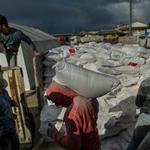Article 3
In the case of armed conflict not of an international character occurring in the territory of one of the High Contracting Parties, each Party to the conflict shall be bound to apply, as a minimum, the following provisions:
1. Persons taking no active part in the hostilities, including members of armed forces who have laid down their arms and those placed hors de combat by sickness, wounds, detention, or any other cause, shall in all circumstances be treated humanely, without any adverse distinction founded on race, colour, religion or faith, sex, birth or wealth, or any other similar criteria.
To this end, the following acts are and shall remain prohibited at any time and in any place whatsoever with respect to the above-mentioned persons:
(a) Violence to life and person, in particular murder of all kinds, mutilation, cruel treatment and torture;
(b) Taking of hostages;
(c) Outrages upon personal dignity, in particular humiliating and degrading treatment;
(d) The passing of sentences and the carrying out of executions without previous judgment pronounced by a regularly constituted court, affording all the judicial guarantees which are recognized as indispensable by civilized peoples. (Emphases added, Fourth Geneva Convention/Geneva Convention Relative to the Protection of Civilian Persons in Time of War, 1949)
———–
One of the founding documents of international humanitarian law, the Fourth Geneva Convention, makes mention in its third article of certain givens that build upon ideas of human worth. These givens imply that human beings, merely by reason of being born into the human race, are considered to be more valuable and worthy than any other creation, entity or species. This is an essential concept behind the traditional understanding of humanitarianism, where human value requires protection at times of emergency, conflict and need.
In this article, I discuss the idea of human worth in relation to humanitarianism by reflecting on the works of three scholars from three different time periods. I depart from an argument that humanitarianism does not exist separately from the non-humanitarian world and contend, rather, that it is a product of that world. By exploring the thoughts of John Stuart Mill (1806–1873), Hannah Arendt (1906–1975) and Martha Nussbaum (1947–), I provide my own reflections on the origins, implications and reality of human worth in humanitarianism. In examining these thoughts, I will pay close attention to John Stuart Mill’s Utilitarianism (1861), Hannah Arendt’s The Origins of Totalitarianism (1951) and Martha Nussbaum’s The Cosmopolitan Tradition (2019). I will begin by discussing each thinker in their own right, before concluding with my own empirical reflections on human worth and the subtle differences between the terms ‘refugee’, ‘migrant’ and ‘expat’.



